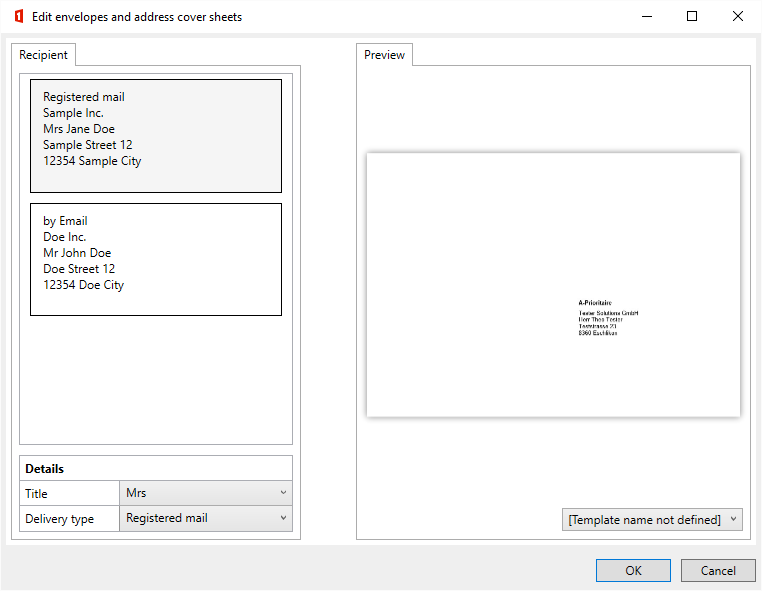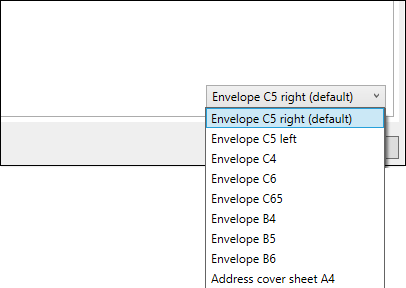Address cover sheet
This document function is needed to configure the handling of address cover sheets (usually address cover sheets and envelopes).
Thereby the document function has two functions:
- Configuration of templates of the type "address cover sheet".
- Configuration of how an address cover sheet can be created from the generated document in Word via the envelope button in the ribbon.
Configuration
For templates of the type "Address cover sheet" the attachment of this document function is mandatory. In addition, the document function Recipient address must be attached before this document function.
<?xml version="1.0"?>
<AddressCoverConfiguration>
<!-- Sample configuration address cover sheet template -->
<AddressCoverTemplate>
<!-- Configuration for preview -->
<RecipientPreview>
<DataNode id="CustomElements.Recipient.AddressCover" />
</RecipientPreview>
<!-- Scripts for Data Binding -->
<Script>
<CustomDataNode id="Recipient.AddressCover" type="Text">
<Line>
<Element id="Recipient.Selected.Transmission" />
</Line>
<Line>
<Element id="Person.Anschrift" />
</Line>
</CustomDataNode>
</Script>
</AddressCoverTemplate>
<!-- Sample configuration address cover sheet dialog -->
<AddressCoverDialog>
<!-- Allowed templates -->
<LabelTemplates>
<Template id="18e4a599-3d93-41a3-a289-39fe5263eab5" /> <!-- Envelope C5 right (default) -->
<Template id="4049d9de-ac64-4441-bec9-f342b3dc15b6" /> <!-- Envelope C5 left -->
<Template id="84f1d9e1-e6dd-4c2a-864b-67bda8216e2e" /> <!-- Envelope C4 -->
<Template id="1948dcff-288d-466a-9598-9a33c16f87de" /> <!-- Envelope C6 -->
<Template id="bc498318-387a-4792-aa76-d50331a70c74" /> <!-- Envelope C65 -->
<Template id="5aadd902-d86d-4e4c-b6ab-b944190309e7" /> <!-- Envelope B4 -->
<Template id="89cd2dce-1fb2-4631-8135-338db1497a22" /> <!-- Envelope B5 -->
<Template id="0bcb7ff8-4d54-425e-a48d-2edc9aea3fb3" /> <!-- Envelope B6 -->
<Template id="24886fd2-01a9-49a2-80e9-2a920e6392d3" /> <!-- Address sheet cover A4 -->
</LabelTemplates>
<!-- Salutation configuration -->
{[Recipients.SalutationConfiguration]}
<!-- Shipping method configuration -->
{[Recipients.ShippingMethodConfiguration]}
</AddressCoverDialog>
</AddressCoverConfiguration>
In this case only the part between <AddressCoverTemplate> and </AddressCoverTemplate> is relevant.
Recipient preview
Between <RecipientPreview> and </RecipientPreview> the text to be displayed for the preview can be configured:
<RecipientPreview>
<DataNode id="CustomElements.Recipient.AddressCover" />
</RecipientPreview>
The id of the text must be specified. Normally it remains as above.
Scripts
Between <Script> and </Script> scripts can be defined, which are finally generated per recipient. So, for example, if <element id="Contact.Recipient.Selected.Person.FirstName" /> is used to refer to the first name, the first address cover sheet will use the first name of the first recipient and the second address cover sheet will use the first name of the second recipient. This pattern runs through all selected recipients.
By default, the script looks like this, whereas "Person.Anschrift" is a script which displays the whole address:
<Script>
<CustomDataNode id="Recipient.AddressCover" type="Text">
<Line>
<Element id="Recipient.Selected.Transmission" />
</Line>
<Line>
<Element id="Person.Anschrift" />
</Line>
</CustomDataNode>
</Script>
Link
If the document function is attached to a Word template, the document function will cause an address cover sheet or envelope to be output with the currently selected recipient using the envelope button in the OneOffixx ribbon:

The dialog that appears when you click on the envelope button in the ribbon looks like this:

Available address cover sheet templates:
They are defined between <LabelTemplates> and </LabelTemplates>. Here is an example configuration:
<LabelTemplates>
<Template id="18e4a599-3d93-41a3-a289-39fe5263eab5" /> <!-- Envelope C5 right (default) -->
<Template id="4049d9de-ac64-4441-bec9-f342b3dc15b6" /> <!-- Envelope C5 left -->
<Template id="84f1d9e1-e6dd-4c2a-864b-67bda8216e2e" /> <!-- Envelope C4 -->
<Template id="1948dcff-288d-466a-9598-9a33c16f87de" /> <!-- Envelope C6 -->
<Template id="bc498318-387a-4792-aa76-d50331a70c74" /> <!-- Envelope C65 -->
<Template id="5aadd902-d86d-4e4c-b6ab-b944190309e7" /> <!-- Envelope B4 -->
<Template id="89cd2dce-1fb2-4631-8135-338db1497a22" /> <!-- Envelope B5 -->
<Template id="0bcb7ff8-4d54-425e-a48d-2edc9aea3fb3" /> <!-- Envelope B6 -->
<Template id="24886fd2-01a9-49a2-80e9-2a920e6392d3" /> <!-- Address sheet cover A4 -->
</LabelTemplates>
This now means that when you call the envelope dialog, you can choose between these four templates. The Id is the template Id, not the version Id of the template. In the dialog it looks like this in the lower right corner:

Salutation and shipping method:
In addition, the salutation and dispatch type must be configured. This configuration should be similar to the one in the document function "Recipient address". As a rule, the following two lines are used to link the salutation and shipping method configuration with the global configurations:
<!-- Salutation Configuration -->
{[Recipients.SalutationConfiguration]}
<!-- Shipping Method Configuration -->
{[Recipients.ShippingMethodConfiguration]}
For more information about the salutation and shipping method configurations, see the Recipient Address document function.